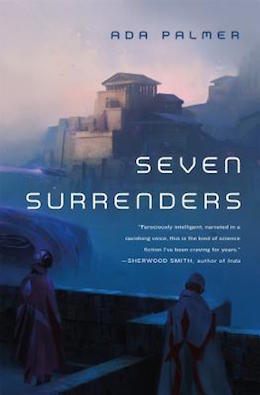I called Ada Palmer’s debut Too Like The Lightning “devastatingly accomplished… an arch and playful narrative,” when I reviewed it last summer. Too Like The Lightning was one part of a whole, the first half of a narrative that I expected Seven Surrenders would complete—and back then I said I couldn’t imagine that Palmer would “fail to stick the dismount.”
I may have been a trifle optimistic, for while Too Like The Lightning is a glittering baroque entry into the ranks of science fiction’s political thrillers, it saves its debut-novel flaws for the second part of the narrative. Seven Surrenders isn’t a poor continuation (or a conclusion: I’m given to understand that the Terra Ignota books will be four in number, with each two forming separate arcs) by any stretch of the imagination. But the span of months that separates the two volumes left me quite a lot of time to reflect on Too Like The Lightning. Time to lose the initial white heat of intoxication at Too Like The Lightning’s self-consciously archaising tone, its arch wryness, its playful blasphemy and neo-Enlightenment concerns. Too Like The Lightning dazzled with possibility: now Seven Surrenders has to turn all that shine into substance, and that?
That’s a tall order.
With Mycroft Canner’s Enlightenment-esque voice and their happily changeable approach to gendered pronouns no longer possessed of enchanting novelty, Seven Surrenders faces the challenge of turning the political and personal intrigues of Too Like The Lightning, its theologies and miracles and thematic concern with conflict in the post-scarcity age, into a coherent whole. But it turns out that it’s quite difficult to forge a climax and conclusion that satisfies the appetite when my expectations were raised pretty high: Seven Surrenders’ major problem is that there’s just too much going on across these two books for it to wrap up enough strands with enough attention paid to each that the reader feels that they’ve paid off.
It becomes clear in Seven Surrenders that Palmer’s series is building towards war, a war that further books may, perhaps, deal with—or whose consequences they may deal with—in more detail. (Some of the statements Palmer’s characters make about war strike me as factually dubious—for example, claiming an absence of major non-colonial wars for a generation before the start of WWI ignores the Ottoman-Russian, Greco-Turkish, and Balkan conflicts between 1877 and 1914, which developed, if the major powers were looking, new tactics for warfare with modern weapons; while asserting technological change and lack of knowledgeable veterans as the primary causes of the high casualty rate of the Great War is definitely arguable.) But the clever card-pyramid of intrigue and secrets and betrayals and lies and plausible deniability that Palmer set up in Too Like The Lightning on the way to this end doesn’t come together cleanly, or with a minimum of confusion in Seven Surrenders. However realistic and true-to-life this confusing trail of conflicting agendas might be, the difference between real life and fiction is that fiction, ultimately, needs to make sense. And in a novel where the world’s biggest movers and shakers are all part of the same faintly sordid sex club, I feel that the gap between the global and the personal needs to collapse a little more smoothly and with fewer hastily-wrapped dangling strands.
The political manoeuvrings, grand and personal, sit awkwardly alongside the peculiar immanent theology of Palmer’s novels. In Too Like The Lightning, the truth of Mycroft’s theological claims—the divinity of J.E.D.D. Mason, the miraculous powers of the child Bridger—rested in a state much like Schrödinger’s Cat, thanks to Mycroft’s unreliable nature as a narrator. But Seven Surrenders removes this fertile uncertainty, and give us narrative confirmation of the presence of divinity alongside the mundane.
This doesn’t make Seven Surrenders a bad book, mind you: taken together, Too Like The Lightning and Seven Surrenders make one extremely promising debut novel, but one where the promise of the first half is let down by the execution of the second. Seven Surrenders remains playfully baroque, vividly characterised, and possessed of a lively sense of humour, as well as a lively and argumentative interest in future societies and the problems of utopia. It’s just not the tour-de-force second book I was hoping for.
Seven Surrenders is available now from Tor Books.
Read an excerpt from the novel here on Tor.com.
Liz Bourke is a cranky queer person who reads books. She holds a Ph.D in Classics from Trinity College, Dublin. Find her at her blog. Or her Twitter. She supports the work of the Irish Refugee Council and the Abortion Rights Campaign.










